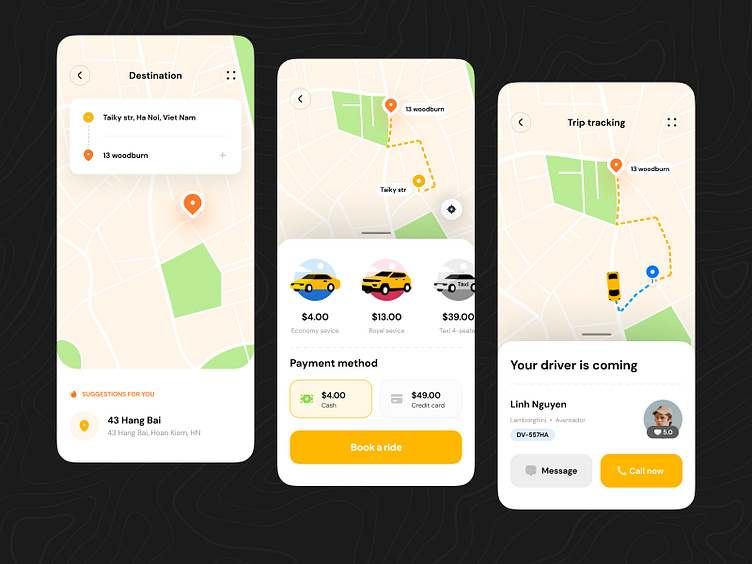Taxi mobile ui
A Taxi App is a digital platform that connects passengers with drivers for ride-hailing and transportation services. It offers seamless booking, real-time tracking, secure payments, and user-friendly interfaces for both passengers and drivers. Below is a detailed guide to building a Taxi App, including its key features, technology stack, and monetization strategies.
Key Features of a Taxi App:
1. Passenger App Features
User Registration/Login:
Allow users to sign up via email, phone numbers, or social media accounts.
Enable secure login with two-factor authentication (2FA).
Booking Interface:
Simple interface for entering pick-up and drop-off locations.
Options for immediate or scheduled rides.
Real-Time Tracking:
Display the driver's location, estimated arrival time (ETA), and route on a live map.
Fare Estimation:
Show an upfront fare estimate before booking.
Ride Options:
Provide different ride categories (e.g., Economy, Premium, Shared, Luxury).
In-App Payments:
Support multiple payment options such as credit/debit cards, digital wallets, cash, and "Buy Now, Pay Later."
Push Notifications:
Notify users of ride confirmations, driver arrivals, trip progress, and promotions.
Ratings and Reviews:
Allow passengers to rate their ride and provide feedback on the driver.
2. Driver App Features
Driver Profile and Verification:
Enable drivers to create profiles and upload required documents for verification (e.g., license, insurance).
Ride Requests:
Allow drivers to accept or decline ride requests with trip details (pickup, drop-off, fare).
Navigation Assistance:
Integrate turn-by-turn navigation for efficient route planning via Google Maps or Mapbox.
Earnings Dashboard:
Show daily, weekly, and monthly earnings along with completed trips and pending payments.
Availability Toggle:
Allow drivers to mark themselves as available or unavailable for rides.
3. Admin Panel
User and Driver Management:
View, manage, and approve passenger and driver accounts.
Trip Monitoring:
Track all ongoing trips, driver locations, and ride statuses in real time.
Analytics and Reports:
Provide insights into revenue, ride volume, user engagement, and top-performing drivers.
Surge Pricing Management:
Enable dynamic fare adjustments based on demand and traffic.
Promotions and Discounts:
Create and manage promotional offers, referral programs, and loyalty rewards.
4. Core Functionalities
Ride Scheduling:
Allow users to book rides in advance by selecting a preferred date and time.
Ride-Sharing:
Offer shared rides for cost savings and reduced environmental impact.
SOS/Emergency Button:
Include an emergency button that allows passengers to share their ride details with trusted contacts or local authorities.
Split Fare:
Let users split the fare with other passengers during group trips.
Multi-Language and Multi-Currency:
Support regional languages and currency options for global audiences.
Advanced Features for a Taxi App:
AI-Powered Route Optimization:
Use AI to suggest the most efficient routes and minimize trip times.
Driver Heatmaps:
Show high-demand areas to help drivers maximize earnings.
Ride History:
Provide detailed ride history for passengers and drivers, including trip dates, distances, and fare breakdowns.
Corporate Accounts:
Offer tailored solutions for businesses to manage employee transportation.
Vehicle Tracking:
Integrate GPS tracking for better monitoring of vehicles and safety.
Technology Stack for a Taxi App:
Frontend Development:
Passenger and Driver Apps: Flutter, React Native, or native languages (Swift for iOS, Kotlin/Java for Android).
Admin Panel: React.js, Vue.js, or Angular for creating responsive dashboards.
Backend Development:
Languages: Node.js, Python (Django/Flask), or Ruby on Rails.
Database: MongoDB, PostgreSQL, or Firebase for storing user data, trip details, and payments.
APIs and Integrations:
Maps and Navigation:
Google Maps API, Mapbox, or OpenStreetMap for real-time navigation and location services.
Payment Gateways:
Stripe, PayPal, Razorpay, or Braintree for secure payment processing.
Push Notifications:
Firebase Cloud Messaging (FCM) or OneSignal for ride updates and alerts.
SMS and Communication:
Twilio or Plivo for SMS updates and in-app calling.
Cloud Services:
AWS, Google Cloud, or Microsoft Azure for scalable hosting and storage.
Monetization Strategies:
Ride Commissions:
Take a percentage of each fare as a commission.
Surge Pricing:
Increase fares during peak hours or high-demand situations.
Subscription Plans:
Offer subscription plans for regular users with perks like discounted rides and priority booking.
Advertising:
Display ads in the passenger app or partner with local businesses for promotions.
Corporate Partnerships:
Provide transportation solutions for businesses with discounted bulk bookings.
Best Practices for Developing a Taxi App:
User-Friendly Design:
Prioritize intuitive navigation and minimal clicks for booking rides.
Optimize for Performance:
Use caching, optimized APIs, and efficient database queries for fast app performance.
Prioritize Security:
Ensure secure payment processing, encrypt user data, and verify driver credentials.
Scalability:
Build a backend infrastructure that can handle high volumes of users and ride requests.
Regular Updates:
Continuously improve the app by incorporating user feedback and updating features.
Example Use Case Scenarios:
Urban Ride-Hailing:
Provide convenient transportation in cities with real-time tracking and dynamic pricing.
Airport Transfers:
Offer scheduled or immediate pickups from airports with luggage-friendly vehicles.
Corporate Solutions:
Partner with companies to manage employee transportation with fixed pricing.
Ride-Sharing Services:
Reduce costs for passengers by pooling rides in high-demand areas.
Conclusion:
A Taxi App simplifies transportation by offering real-time booking, secure payments, and advanced tracking features for passengers and drivers. By integrating cutting-edge technologies like AI-powered route optimization and GPS tracking, you can deliver a seamless, efficient, and user-friendly experience. Focus on security, performance, and scalability to ensure long-term success in the competitive ride-hailing industry.
💬 Let’s discuss!
I’m online in Telegram and Discord to discuss your project:
Telegram: http://t.me/doctordesign
Discord: https://discordapp.com/users/r.koohi99#8459
LinkedIn: www.linkedin.com/in/rooholla
Email: Hi@roohi.pro
